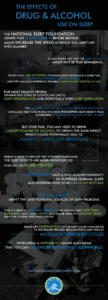Although many people are aware of the high-profile dangers of drug and alcohol abuse, fewer understand how these negative habits might impact their sleeping patterns. True, substance abusers who favor drugs like methamphetamine or cocaine may be accustomed to going without sleep for extended periods. What’s less commonly acknowledged among the general public is how widespread the effects of drugs on sleep can be for long-term users. Here’s a quick primer.
The Effect of Alcohol on Sleep
Many people remain unaware of how their alcohol consumption might worsen their sleeping patterns, and this may have to do with accepted cultural practices. For instance, it’s considered completely normal for some people to drink beer or wine to relax at night and promote sleep.
(Continued below image…)
The National Sleep Foundation admits that limited imbibing before bedtime might increase the speed at which you drift off into slumber. On the other hand, it also points out that the sleep you get might not be that rewarding. People who use alcohol to induce sleep often have a hard time maintaining peaceful nighttime states, and they may also experience trouble achieving deep-sleep REM cycles.
The Scientific Background
According to the NIH National Institute on Alcohol Abuse and Alcoholism, researchers have been trying to understand how alcohol impacts sleeping habits since the 1930s. Today, the consensus is that for most healthy people, drinking high doses of alcohol will lead to sleep disturbances and potentially even sleep deprivation. Your lack of sound nighttime rest might induce a persistent state of being tired during the day when you should be attentive.
The NIH concludes that some people who have insomnia might benefit from consuming low doses of alcohol to get to sleep. It also adds the caveat, however, that the sedative effects wear off quickly as you build up a tolerance. Over time, you may need to drink larger volumes of alcohol to obtain the same impact, which could potentially lead to harmful, addictive behaviors. Many researchers even dispute the idea that the minimal benefits are worthwhile by noting that the disruptive effects are more prominent than any advantages.
The Effects of Drugs on Sleep
Illicit Drugs
As with alcohol consumption, the sleep-related consequences of using a given drug may vary based on how you use it. For instance, the impacts of using marijuana in moderation are markedly different from the results of chronic use.
Research seems to indicate that with many substances, the sleep effects are more pronounced when you use more heavily. Individuals may also experience significantly heightened sleep disturbances, sleep cycle irregularities and altered dreams when they abuse drugs as opposed to using them on rare occasions.
Some drugs contribute to persistent health problems that make it harder to sleep properly. This is especially true of stimulants, which have a well-known tendency to suppress normal sleep and interfere with your circadian rhythms. Persistent drug usage that shifts your waking cycle might also cause you to develop lasting sleep disorders, experience constant fatigue or become a workplace danger.
Medical Drugs
It’s important to understand that illegal drugs aren’t the only potential sources of sleep problems. Similar issues also occur with some legal substances, and they may be trickier to deal with because people are unaware that they exist. For instance, Fullerton University research noted that many of the impacts that prescription drugs have on sleeping habits are discovered through clinical observation without sleep studies being mandated by government clinical trial rules. Furthermore, even if a drug is legitimately prescribed, the user may take more than prescribed, take it more often, or it may be taken by someone other than the original prescribed person.
What does this all mean? In short, people who abuse medications may suffer adverse sleep side effects. The Fullerton study highlighted sleep problems among those who use:
- Antipsychotics
- Antidepressants
- Mood stabilizers
- Painkillers
- Various narcotics
The bottom line is there are a variety of drugs that are abused and therefore have a negative effect on sleep. Drugs like sleeping pills may be particularly dangerous in this regard precisely because people take them to modulate their sleep cycles. Since many of these substances can induce dependence, it’s possible that they might make your sleep issues even more pronounced or skewed without really correcting the cause of the problem. Developing a dependency might also mean that you can no longer rest without sleeping pills.
The Bottom Line
When used cautiously, certain prescribed drugs may have limited beneficial impacts. When it comes to getting rest, however, it’s important to understand that safe use and excessive habits aren’t the same things. Abusing drugs can worsen your sleep significantly, which hinders your ability to make smart decisions, stay healthy and enjoy life in general.














